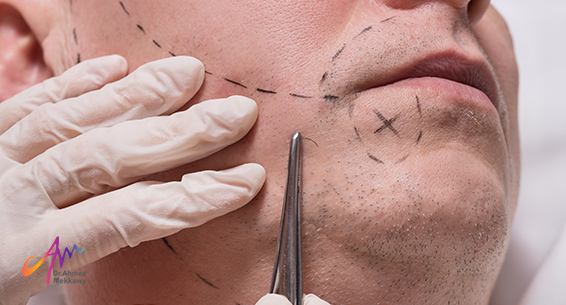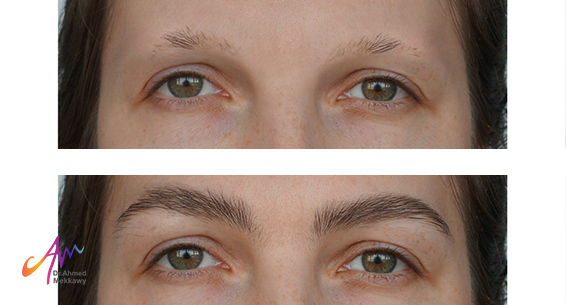Beard Hair Transplantation

Beard Hair Transplantation
Hair transplantation techniques initially aimed to address hair loss and baldness by redistributing hair follicles on the scalp. However, with the evolution of transplantation techniques, it has become possible to do beard, mustache, or even eyebrow hair transplantation. In this article, we will explore everything related to beard hair transplantation.
Before Beard Hair Transplantation:
The goals of beard hair transplantation usually depend on the individual's desired outcome. Objectives can vary, with some cases seeking to enhance beard density, others aiming to achieve a natural beard appearance for those unable to grow a beard naturally, and some using transplantation to cover old scars.
During Your Visit to Dr. Ahmed Mekkawy:
When visiting Dr. Ahmed Mekkawy, a plastic and hair transplant surgeon, he will initially discuss your goals for the procedure and your expectations for the results. He will also examine your case to ensure you are a suitable candidate for beard hair transplantation.
Additionally, he will:
• Discuss your current health status and medical history.
• Inquire about any medications you currently take regularly.
• Request that you quit smoking for a period if you are a smoker.
• Potentially require tests and analyses, including a complete blood count, kidney and liver function tests, clotting analysis, and more.
If you decide to proceed with beard hair transplantation:
• The doctor will adjust some of the medication doses you are taking and prescribe other necessary medications before the procedure.
• You should completely quit smoking due to its detrimental effects.
• It's better to avoid blood thinners like aspirin.
In addition, he will discuss the likelihood of any side effects and how to minimize them. He will explain the suitable procedure steps for you and provide an overview of the expected results of post-beard hair transplantation. You can prepare any questions you have in mind to discuss with the doctor and ensure you are well-informed and at ease before undergoing the transplantation.
Frequently Asked Questions:
• Am I a good candidate for hair transplantation?
• What type of technique can be used for beard hair transplantation?
• How long does a beard hair transplantation procedure take?
• Are there any risks associated with beard hair transplantation?
• What are the side effects of beard hair transplantation, and how to avoid them?
• When do the final results appear?
• Can I see some before and after photos of previous cases?
Cost of Beard Hair Transplantation:
The cost of beard hair transplantation varies based on several factors, including the number of follicles to be transplanted to cover the beard area, the type of technique used for transplantation, as well as hospital, accommodation, and travel costs if you're coming from another country for medical tourism to Dr. Ahmed Mekkawy, a specialist in plastic surgery and hair transplantation.
The cost of beard hair transplantation with Dr. Ahmed Mekkawy starts at $1400, and it may vary depending on the previously mentioned factors.
Steps of Beard Hair Transplantation:
Beard hair transplantation is carried out in several stages, beginning with:
1. Extraction Phase:
In this phase, the surgeon shaves a very short portion of the back of the head for easy extraction. Then he sterilizes the area and extracts the hair follicles one by one. The doctor places these follicles in sterilized containers until transplantation to the beard area. The area from which the follicles are extracted is called the donor area due to the follicles donation for transplantation in the beard during subsequent stages. After follicle extraction from the back of the head, the doctor may apply some dressings and compression bands to minimize swelling and bruising.
2. Anesthesia Phase:
After extracting the appropriate number of hair follicles for transplantation, the beard area is sterilized, and local anesthesia is applied before the transplantation process begins. Very precise channels are opened in the beard area to accommodate the transplanted follicles.
3. Transplantation Phase:
Finally, the extracted follicles are transplanted individually into the channels created, distributing them to naturally cover the beard area. After the transplantation is complete, you will be able to leave the hospital and start recovering at home immediately, following Dr. Ahmed Mekkawy's instructions and advice.
Recovery Period After Beard Hair Transplantation:
The recovery period after beard hair transplantation begins when Dr. Ahmed Mekkawy provides you with a treatment kit containing everything you need during the recovery process. Additionally, he offers some advice, including:
• Avoid engaging in any strenuous physical activities for a while until the transplanted follicles settle.
• Apply cold compresses to the back of the head to reduce swelling and bruising.
• Avoid scratching the face, especially the areas where hair has been transplanted, to prevent dislodging the transplanted hair.
• Consume plenty of vitamins and minerals to minimize swelling and bruising as quickly as possible. Also, avoid smoking to prevent worsening swelling.
• The doctor will prescribe antibiotics to prevent infections, as well as anti-inflammatory, antihistamine, and pain-relieving medications as needed to manage swelling and discomfort.
Side Effects of Beard Hair Transplantation:
There are no risks associated with beard hair transplantation as long as you choose an experienced and skilled surgeon like Dr. Ahmed Mekkawy. However, there are some side effects you may notice during the recovery phase, such as:
• Redness: This is a normal occurrence that lasts for some time and can be reduced with cold compresses.
• Swelling and bruising: These are also natural side effects that will fade over time. They can be minimized by following the doctor's instructions.
• Infection: Extremely rare, as Dr. Ahmed Mekkawy ensures you are provided with the appropriate antibiotics to prevent any infections.
• Bleeding: Easily controlled, if it occurs, with consultation and proper medication usage.
• Hair shearing: This is a natural process that occurs around two weeks after hair transplantation as part of the recovery process. However, don't worry, as the hair will regrow permanently within weeks.
Results of Beard Hair Transplantation:
The results of beard hair transplantation become visible within several months, typically around 6 to 8 months. After a year, you can achieve the final results. During this period, the transplanted hair starts growing again without shedding, bruises begin to fade, and swelling disappears without leaving a trace.
The results of hair transplantation are permanent. The transplanted hair follicles continue to grow naturally as part of the transplanted area, taking on the characteristics of the donor area from which they were extracted.
Now that you've learned everything about beard hair transplantation, have you ever considered benefiting from this unique technique that fulfills your aspirations? For more information about beard hair transplantation, as well as to book an appointment or inquire further, contact us and schedule your consultation with Dr. Ahmed Mekkawy, a specialist in plastic surgery, body sculpting, and hair transplantation.
This content has been reviewed by Dr. Ahmed Mekkawy, a consultant in cosmetic surgery, body contouring, and natural hair transplantation.


.jpg)